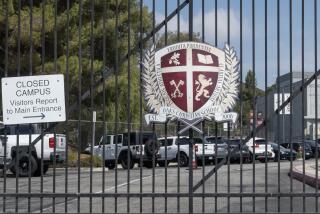E-Mail Threat Case Tests Free Speech Limits
- Share via
IRVINE — The electronic mail from “Asian Hater” was chilling.
All Asians should leave UC Irvine, otherwise Asian Hater would “hunt all of you down and kill [you].”
“I personally will make it my [life’s work] to find and kill everyone of you personally. OK? That’s how determined I am,” said the message transmitted to about 60 UC Irvine students. “Do you hear me?”
Asian Hater turned out to be Richard Machado, a 19-year-old UC Irvine student.
Upon learning his identity, authorities charged Machado, a newly naturalized U.S. citizen from El Salvador, with 10 counts of civil rights violations, the first federal prosecution of an alleged hate crime committed on a computer network.
In a case that promises to roil the ongoing debate over freedom of speech in cyberspace, Machado’s attorneys are asking a federal judge in Santa Ana to strike down as unconstitutional the law under which Machado was charged. The Civil Rights-era law conflicts with the normal practices of the electronic age, they say.
“Mr. Machado’s words may be offensive to some people,” said Deputy Federal Public Defender Sylvia Torres-Guillen. “But it is not . . . acceptable for the government to prohibit or criminalize his speech because of the politics which underpin it.”
Legal experts say the case is veering into uncharted territory, raising questions such as: When does speech become criminal conduct? When do words wound? And should speech on a largely unregulated computer network be subject to the same legal standards as speech in any other medium?
Federal prosecutors are insisting that Machado’s threats to kill students were not protected speech.
Machado sought to interfere with the rights of students to attend a public school, and his action, according to Assistant U.S. Atty. Michael J. Gennaco, violated the same laws as those who sought to prevent blacks from entering schools, parks and other public places during the 1960s.
Machado’s case may mark the first prosecution of a hate crime in cyberspace, but one that law experts say is likely to become more common as hate groups take to the Internet with electronic campaigns against minorities.
“We’re going to see more of [these cases], especially since the Internet gives some people a cloak of anonymity,” said Gabriel Jack Chin, a professor at Western New England College School of Law in Springfield, Mass. “A quiet and introverted person with a modem and computer could turn himself into a Rambo.”
The e-mail message that could put Machado behind bars for as long as 10 years was transmitted Sept. 20, 1996, from the school’s engineering building.
“I hate Asians. . . . You are responsible for ALL the crimes that occur on campus,” read Machado’s e-mail, the text of which was released in court papers filed last week. “That’s why I want you and your . . . comrades to get . . . out of UCI.”
Campus police traced the e-mail to Machado, who a week later gave a handwritten confession to investigators.
Machado said he was “bored” and “wanted to see people’s reaction to an e-mail” threat, according to the confession, which was released along with the message’s text. Machado said he gave the message “a sense of hatred,” but “meant no harm whatsoever. . . . My intentions were spontaneous, unrehearsed and with no bad intentions.”
In a subsequent statement to campus police, Machado said he targeted Asian students because, among other factors, Asians were doing better than he was in school, according to court papers.
The e-mail incensed and upset some students of Asian descent, who make up nearly half of UC Irvine’s 17,000 students, the largest percentage of any UC school.
Some students sought out campus counselors for help. Others, including Nicole Inouye, chairwoman of UC Irvine’s Asian-Pacific Student Assn., met with Machado. Inouye said the young man appeared soft-spoken and contrite. He apologized for hurting their feelings.
But if Machado thought his message was harmless, he found out otherwise in mid-November when a federal grand jury indicted him on 10 counts of civil rights violations.
There are no laws that specifically address hate crimes in cyberspace. But Gennaco got around that problem by using a statute passed by Congress in the 1960s to overcome obstacles to school desegregation in the South.
The law seeks to penalize anyone who “whether by force or threat of force . . . attempts to injure, intimidate or interfere with . . . any person because of his race, color, religion and national origin and because he is or has been enrolling in or attending any public school or public college.”
Before Machado’s indictment, the federal government had sought to charge only one other person with using e-mail to threaten violence, and that case had sexual--rather than racial--undertones.
Machado’s pending trial has added to the debate about freedom of speech on the largely unfettered Internet.
According to some experts, people who log onto a computer network accept the risks of encountering inflammatory speech, because the Internet is a domain where talk is cheap and vitriolic exchanges are commonplace.
In papers filed last week, defense attorney Torres-Guillen said the law under which Machado was charged hinders “pure speech” because it “seeks to criminalize the sending of an e-mail message.”
“The government may not be able to rest its case on the discomfort or embarrassment that victims may feel,” Torres-Guillen said.
Gennaco responded that the government is not prosecuting Machado simply because it disagrees with his message. Machado is facing charges because he “threatened to hunt down all of the recipients of [the e-mail message] and kill them,” Gennaco said.
More to Read
Sign up for Essential California
The most important California stories and recommendations in your inbox every morning.
You may occasionally receive promotional content from the Los Angeles Times.










